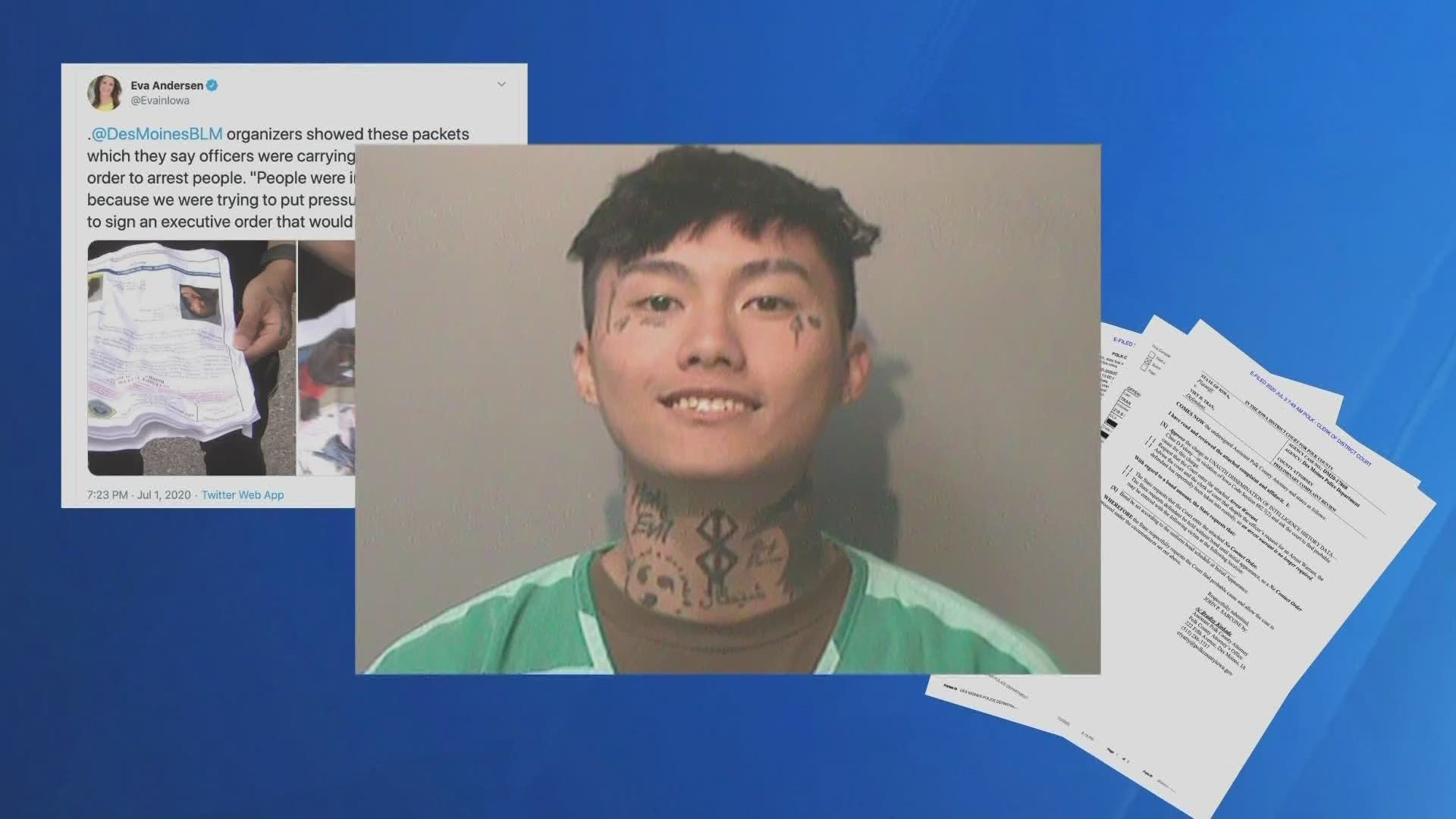DES MOINES, Iowa —
On July 1, following a Black Lives Matter gathering at the Iowa State Capitol, 21-year-old Viet Tran showed a Local 5 camera crew a document law enforcement used to arrest certain people.
Tran was jailed and charged with a felony count of Dissemination of Intelligence Data, which carries a possible prison sentence of up to five years.
A bond review hearing is scheduled in the case for Thursday.
The footage during Local 5's newscast included parts of Tran's hands as he held a police document, one that the Des Moines Police Department says he himself did not steal.
A notation atop the document read:
“The information contained in this communication is intelligence data and should not be re-disseminated without approval from the agency that originally disseminated the intelligence data”
Since 2010, the charge Tran is facing has only been used one other time. And this is the first instance since then of a civilian facing the charge.
In a criminal complaint, Tran is accused of having "obtained with authorization a DMPD intelligence bulletin and provided this to the local media station... who then broadcast the confidential information on the television and on the internet through news coverage."
26-year-old Alexandria Day is charged with Theft in the First Degree, accused of taking the intelligence bulletin from an officer.
"This bulletin would later be distributed on a local news station," the complaint reads.
Local 5 was not asked to remove any footage of the document. But it still left Tran with a rare felony charge that landed him back in jail.
"In 46 years of being a journalist, I've never heard of someone being prosecuted for sharing a pamphlet that they themselves did not steal, with a reporter," said Al Tompkins with The Poynter Institute.
Tompkins said he feels the charge may be a move by police to prevent activists from talking to reporters.
"I don't know if that's the police intent or not, but it's the potential outcome of this to say: 'Don't talk with the media. And if you do, we might even just use that as a way to prosecute you, to put you in jail,'" Tompkins said. "And in the middle of a pandemic, by the way."
Des Moines police said the charge is appropriate. In an email to Local 5, they emphasized that the handling notice on the paper was at the top and anything contained in the document is sensitive and protected by law.
Attorney Sally Frank was a legal observer at the protests that day, and saw law enforcement holding the bulletins such as pictures of suspects police were seeking following a previous protest at Hy-Vee where a police car was vandalized.
Some were contacted by police the night before to turn themselves in, which they refused to do.
She doesn't believe the pictures actually constitute "intelligence data", which is defined in Iowa law as "information on identifiable individuals compiled in an effort to anticipate, prevent or monitor possible criminal activity."
"This does not seem to be that, because they were arresting people from it," Frank, a law professor at Drake University, said. "So it wasn't to monitor or prevent, it was to apprehend and find."
But the Iowa Department of Public Safety said it's important not to jump to conclusions.
"That information is essential to law enforcement," said Iowa DPS Assistant Director of Intelligence Patrick Waymire. "And it's also essential that we protect that information."
While law enforcement decides what is released to the media, Waymire said certain information "needs to stay confidential."
But Frank believes the real issue is that law enforcement wasn't careful with the information, adding that dissemination is written to primarily address officers who mishandle such information.
"So there's a question about whether or not it even applies to a member of the public who just happens to have a copy of it," Frank said.
Retired detective and police commander Patrick Fitzgibbons disagrees.
"The fact is that Mr. Tran obtained this information which he shouldn’t have had in the first place," Fitzgibbons said. "He disseminated it ... on the news, and that’s where the charge came from."
Fitzgibbons teaches criminal justice at the University of Colorado Denver, and while looking at Tran's charges as an outsider, he said whatever was in those bulletins shouldn't have been shared by anyone.
He doesn't believe the recent protests should keep law enforcement from doing their jobs.
"We need to send a message," Fitzgibbons said. "In law enforcement, we're not going to tolerate this anymore."
Prosecutors have resisted a motion to lower Tran's bond in the case due to tweets they believe make him a threat to the public.
Tran's attorney, Glen Downey, and Polk County Attorney John Sarcone both did not issue a statement or provide comments to Local 5 for this story.

